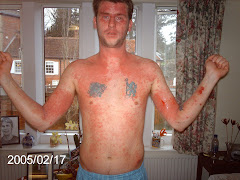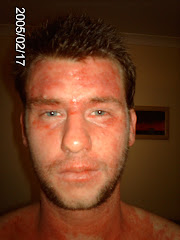Phototherapy
Phototherapy: A Treatment Option for Some Types of Eczema
Phototherapy exposes a patient to ultraviolet (UV) light for a controlled amount of time and may be prescribed to treat moderate to severe:
Atopic dermatitis
Contact dermatitis
When prescribed, phototherapy is likely to be part of a total treatment plan. Typically, a treatment plan includes lifestyle modifications to prevent flare-ups, topical (applied to the skin) treatment, and if needed, stronger therapy, such as medication that is swallowed or injected.
Two types of phototherapy are used to treat eczema:
UV light therapy
PUVA (also called chemophototherapy)
UV Light Therapy
This may be used alone or with a topical treatment, such as coal tar. Ultraviolet A (UVA), ultraviolet B (UVB) or a combination of UVA and UVB therapy may be used. During therapy, the patient's body, or just the affected skin, is exposed to the UV light. Goggles are worn during treatment to protect the eyes. Patients usually receive treatment in a dermatologist's office.
There are two types of UVB therapy:
Broadband (3-5 treatments per week)
Narrowband (2-3 treatments per week)
Broadband - This UVB therapy has been around for more than 80 years, and it is still highly effective. The biggest drawbacks are that the patient must travel between 3 and 5 times per week to a site that offers this therapy and that broadband light does not effectively treat the scalp and areas where skin folds occur.
Narrowband - This newer form of UVB therapy is called “narrowband” because it emits a narrower band of UVB wavelengths. Narrowband UVB therapy is proving more effective than the traditional broadband therapy. However, it does have the potential to produce severe burning. Like broadband, it is still not known if narrowband UVB therapy poses a long-term risk for development of skin cancer.
PUVA
PUVA combines medication with light therapy and stands for "psoralen" + "UVA". Psoralen is a prescription medication that makes the skin more sensitive to UVA rays. Before UVA exposure, the patient swallows, bathes in, or applies psoralen to the skin. After treatment, patients must wear UVA-blocking sunglasses for 1 or 2 days when exposed to sunlight because psoralen remains in the eyes for a while.
PUVA's effectiveness is limited to carefully selected patients whose condition is likely to respond to this therapy. PUVA has a number of side effects, which may include nausea, headache, fatigue, burning skin, itching, and irregular skin pigmentation. A series of treatments is usually needed, and a full course of treatment may take six months. In several studies, patients have had substantial improvements when PUVA was combined with topical corticosteroids.
Why Phototherapy Works
UV light of certain wavelengths affects the immune system. By carefully exposing patients to these UV wavelengths for specified amounts of time, dermatologists are able to prevent the exaggerated immune response that causes the inflammation.
Benefits
The beneficial effects of phototherapy vary from person to person. Phototherapy can:
Significantly improve, and even clear, atopic dermatitis. One study conducted in Germany investigated the effects of phototherapy on severe atopic dermatitis. Investigators found more than 80% of the patients with atopic dermatitis who were treated with phototherapy showed significant improvement, and in some cases, complete clearance within three weeks.
Help prevent bacterial infections, which are common in the skin of patients with atopic dermatitis.
Reduce the strength of topical corticosteroids required, and in some cases, eliminate the need for topical corticosteroids.
Risks
While phototherapy can significantly improve a patient's skin and even completely clear atopic dermatitis in some cases, phototherapy does carry these risks:
UV light is a contributing cause of skin cancer
UV light has been proven to prematurely age the skin
Dermatologists Carefully Weigh Risks and Benefits
Phototherapy is not appropriate for every patient who has eczema. It is not recommended for patients whose eczema flares when exposed to sunlight or anyone who develops a sun-induced allergic reaction. In some patients, phototherapy can worsen eczema.
Dermatologists have the medical training and experience needed to carefully weigh the risks and benefits of phototherapy to determine if this treatment is right for a patient. In considering whether or not phototherapy is appropriate, dermatologists look at a number of factors, including the patient's age, health, medical history, severity of the condition, and history of previous treatment.
Subscribe to:
Post Comments (Atom)




16 comments:
I saw your pics during bad times. Looks like my bad times. Please add my website to your blog roll. http://www.eczemacure.info
Hey how goes it. Its Lun. I am off work once more. First time I was off was for 5 and half months. Now I have been away for 3 weeks. I am flaking away again. I did the Walk for Skin in Manchester which was good. But my face has had it, my arms, legs, buttocks, shins, all just so itchy. I can't take phototherapy though, my eczema is photosensitive (so why is it so bad at night??) Hope all is well, take care
Lun
How To Get Rid Of Eczema Wow, you pics in your bad times were horrible. I can just imagine all the pain and frustration you went through. Glad things are better now
Is a valuable information about child eczema. When attempting to cure a bad case of eczema, a quick visit to your local grocery store will give you the ingredients to prepare an affective topical ointment at a fraction of the price of pharmacy bought creams.
Eczema cures
Hi,
Have you heard of using hazelwood to treat eczema? Our daughter, 18 months at the time, developed eczema all over her body and a friend told us about using a hazelwood necklace to get her son off of heavy acid reflux medicine. Hazelwood works to absorb excess acid from your body. She said it was supposed to help with eczema also so we bought them for the whole family.
It cleared our daughter's skin so quickly that we began retailing them to bring the product into the US (it's more commonly known in Canada). Since then we've seen about a 70% success rate in helping people with their skin issues, particularly children, and we've been doing this over two years. You can learn more at www.hazelaid.com. Your readers need to know about this option.
Best Wishes,
Brian
Have you try this product called PsoEcz Care? It really works on many people. http://www.goapharma.com
I still can't believe that this kind of treatment can really cure eczema. Maybe I should read more blogs about this therapy.
eczema free forever
That is a good piece of information and should be circulated so that most patients know about it and therefore keep away from sunlight and other sources of light.EMR
A lot of people say going on a sunbed helps too but I am scared of them! Hope your skin is better now than it has been. Eczema is awful!
It is very dangerous types of skin problem so one has avoid such problems. Thanks a lot for this nice discussion.
Smith ALan
generic viagra
So any updates??
Very interesting article, the different methods and products available for tackling the eczema problem are many. This method and others deserve more attention. Gerald - Visit Infant Eczema HQ
Hi Guys
not sure if this can help but I run an on-line shop called The Allergy Shop - www.theallergyshop.com.au - with products to cure and treat Eczema
Regards
Christian
I have tried so many different creams. I find they're quite useful in keeping the eczema under control, but once the eczema has really flared then it doesn’t do much, just have to let time heal it. I tried a chamomile and viola cream (ingredients and instructions for remedy at Chamomile and Viola eczema remedy) and found this works well - not as good as medicated cream but gives my skin a break - and stores in the fridge for 6 months so don’t have to make a new batch each time. Does anyone else have any recipes for home made creams? Most store bought stuff has additives that my skin reacts to. I have a lot of negative side effects from 30+ years of using medicated creams.
Hi! I haven't read your whole blog so you may have talked about this already but do you use topical steroids and if so have you used them for a long time or have needed to use stronger and stronger ones? The reason I ask is because I thought I just had really bad eczema since I was using one of the super potent topical steroids but wasn't getting much in the way of results. I tried allergy testing, all kinds of mosturizers, diet changes, etc. But it turns out the topical steroids were causing the rash. It's called topical steroid addiction or Red Skin Syndrome. Might be something worth looking into.
We made all popular certifications so easy so that you can materialize the dream of your achievement. We believe in full customer satisfaction so please have a look on DEMO tests and you will know what it means when we say our products are free from irrelevant details, 1Z0-580, 1Z0-117, HP2-N44, Reinvest that money in you victory dance, after you become the next Oracle Certification from passing your exam.
Post a Comment